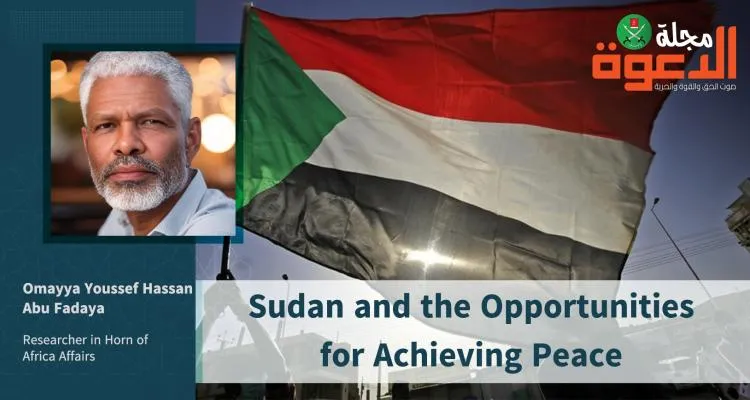

Sudan and the Opportunities for Achieving Peace
Introduction
Sudan has been experiencing ongoing armed conflicts for decades, with the latest outbreak occurring on April 15, 2023. Despite continuous discussions about the need for peace between the conflicting parties, practical solutions to achieve this goal seem to be absent so far. The most recent war, considered one of the worst conflicts witnessed by Sudan, has had a significant impact on citizens, leading to a rare humanitarian disaster in this century according to United Nations reports, in terms of the scale of displacement and asylum.
Sudan has a long history of armed rebellions dating back to before its independence in January 1956. The first of these rebellions occurred in 1955. Despite periods of peace in Sudan's history, they were not permanent. The longest period of peace was between 1972 and 1983, but it ended with the renewal of the conflict led by the Kerbino forces.
The Rwandan Experience
In Rwanda, the country has successfully recovered from a devastating civil war. The war started in October 1990 and lasted until July 1994. During this time, about one million people were killed in three months in massacres described as genocide, committed by the Hutu majority against the Tutsi minority.
Similarities and differences between the wars in Rwanda and Sudan."
1. Nature of the war:
The war in Rwanda was largely tribal, while the conflict in Sudan involved rebel forces fighting against the state to gain control. Although most of the Rapid Support Forces are from specific tribes, they didn't target a particular tribe, but rather everyone in the areas they controlled.
2. Objectives of the war:
In Rwanda, the primary aim was genocide, whereas in Sudan, the aim was political and military control.
3. Armed forces:
The Sudanese army is characterized by the diversity of its members from different tribes, unlike the war in Rwanda, which was entirely tribal.
4. External intervention:
Foreign intervention negatively impacted both wars. Rwanda had to end its reliance on France, while in Sudan, foreign interventions exacerbated the conflict.
5. Human and material losses:
Although the death toll was much higher in Rwanda, Sudan also faces significant challenges due to the destruction of infrastructure and the theft of citizens' wealth.
6. The use of rape as a weapon:
In both wars, rape was used as a means of humiliation and breaking the will of the other party, leading to mass migration.
• How did the war in Rwanda end, and what lessons can be learned from it in the case of Sudan?
1. Military solution:
The war in Rwanda did not end through negotiations, but rather through the military victory of the Rwandan Patriotic Front. The leaders of the genocide fled the country, which allowed for the imposition of new control and the launch of a new phase of state reconstruction.
2. Institutional reform:
After the war, Rwanda reformed its institutions by establishing justice and reconciliation commissions, which were crucial for the trials of those involved in the crimes.
3. Eliminating tribal affiliations:
One of Rwanda's significant measures was the criminalization of tribal affiliation, contributing to the strengthening of national identity.
4. Political stability:
The Rwandan government that emerged victorious in the war maintained its power through democratic elections, providing the country with uncommon political stability following the conflict.
Applying Lessons from Rwanda to Sudan
If Sudan wishes to draw from the Rwandan experience, it can take several steps to achieve lasting peace:
1. Military solution with caution:
While a military solution may be an option, political and diplomatic solutions must be part of Sudan's strategy to prevent the recurrence of conflicts.
2. Reforming judicial and social institutions:
Sudan should consider implementing transitional justice and reconciliation commissions, following the Rwanda model, to ensure accountability for human rights violations.
3. Strengthening national identity:
Strengthening Sudan's national identity should be a top priority as it helps reduce tribal and regional divisions, and fosters a unified society.
4. Minimizing external interference:
Sudan should work on reducing external interference that complicates the crisis and strengthening state institutions to be more independent.
5. Rebuilding infrastructure and supporting development:
Once the conflict is over, the Sudanese government should prioritize economic development and the reconstruction of infrastructure destroyed by war.
6. Investing in education:
Sudan should prioritize the development of education as a cornerstone for stability and growth. Education must be utilized as a tool to foster peaceful coexistence among the various segments of Sudanese society.
7- Benefiting from successful economic experiences:
As mentioned in an article on Al Jazeera Net by the writer Muhammad Zakaria Fadl, these experiences can serve as a source of inspiration for Sudan in its endeavor to achieve peace and development.
- Turning waste into wealth in African countries:
(Sistema.bio), which operates in multiple African countries and offers a successful model for addressing various challenges such as waste management, food security, and affordable energy. The company installs modular biodigesters that convert organic waste into biogas for cooking and biofertilizers for crops. This dual function reduces reliance on wood fuel, lessens logging and deforestation, and decreases greenhouse gas emissions at regional and global levels. This also improves soil fertility and boosts agricultural productivity. "Sistema.bio's" unique approach lies in its ability to adapt to local contexts. By providing affordable technology and developing a business model tailored to local needs, the company enables smallholder farmers to effectively manage their waste and gain greater autonomy in accessing clean energy.


